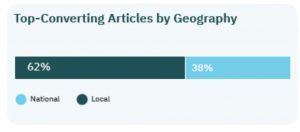If there is one thing that all small business owners have in common it is the volume of hats they must wear. The demands on time are huge, and prioritising where to invest your time and energy is a constant juggling act. It’s no surprise then that SEO tends to take a back seat. SEO is tough. SEO is complicated. SEO is time consuming. Yet it doesn’t have to be all those things, at least not when it comes to getting the basics right. More often than not, it’s the negative impact of some basic SEO mistakes that is the most damaging to small businesses.
Here are the worst SEO sins we see small businesses committing most frequently.
1. Not using the right keywords
Here is a great exercise. Put yourself in your customer’s shoes for a moment. What would you type in to find your business, your products, your services? Write down all of your ideas in a list. You can even go to Google and start typing in these phrases and auto-complete feature will populate a drop down list of similar searches that users have typed in. This information is gold!
Now, take a look at the language on your website- how many of the phrases on your list appear on your pages? How many pages use the phrases in the url, the page title, the first paragraph? If your website features generic phrases such as “our services” or “what we offer” over of specific terms that people are searching for, you have a big SEO hole to fill.
2. Using keywords that are too broad
Another tough position that too many small businesses put themselves in is to use keywords that are too broad, making them almost impossible to rank for.
Think “leather ankle boots for hiking” instead of “hiking shoes”. “motorbike sales in [your city]” instead of “motorbikes”.
There may be less traffic for these longer tail key phrases, but you are far more likely to capture a percentage of it than see any kind of results from more fiercely competitive terms.
3. Keyword stuffing
The more times I use a keyword on the page, the higher Google will see rank me for it, right? Ah, wrong. Actually, the effective frequency with which a keyword appears in a piece of content has steadily shrunk over the past few years. In fact, over-optimising your page by using the same keyword too many times (known as keyword stuffing) can actually get you penalised by search engines.
More important is where the keyword is used, not how often. You should never use the same keyword more than five times per 100 words on a page.
In a nutshell: make sure your keyword appears early in your page title, heading, and opening paragraph for a strong SEO foundation.
4. Poor maintenance
Running a successful website involves a certain degree of good housekeeping. Broken links, missing images and outdated information can not only frustrate your visitor but can send signals to search engines that your site is low quality.
Imagine your website is a virtual version of your physical office or store. What if the building directory sends people to a stationery cupboard instead of your office? Or items are mislabelled on your shelves? Maybe some sections of your store even contain out-of-date perishables or fashion items from the 1990’s that you haven’t got round to clearing out yet? Can Google make sense of this chaos? Does it know what is important and relevant?
Keep your house in order by regularly checking your content for errors. Google’s Webmaster Tools consoles is the ideal (and free) tool to use to help you identify any issues.
5. Content duplication
When you hear the phrase “content duplication” your mind probably automatically thinks about content stolen from other sites. But it’s not just deliberate plagiarism that can cause duplication issues.
Many small business sites use duplicate content on multiple pages without even realising it.
For example, do you have a stock paragraph or two about your business than features on your homepage, your about us page and your contact us page? (How will search engines know which one to rank for your business name?)
Do you use the same descriptive text on multiple product or category pages? Is your shipping information and returns policy on every single product page? (Can search engines see enough unique content to accurately rank you for your primary keywords for these products?)
Maybe you have written ten blog posts about your gutter repair service that only differ in a few sentences? (Therefor diluting your SEO efforts for this keyword across multiple posts.)
Make sure each individual page on your site is customised with content that is unique, and most relevant to the desired keyword.
6. Not optimising for local search
When was the last time you turned to the Ad section of your local newspaper to find a supplier?
If your business relies on providing products or services to your local community then you simply cannot afford to ignore local search optimisation.
Your site should include structured data about your location that helps search engines to properly categorise your business and include it in local searches.
You should also create a listing in any local business directories, as well as major search engines such as Google Business.
7. Ignoring SEO completely
Otherwise known as the “I just don’t have the time to learn and implement this stuff” complaint.
It’s not an invalid one, but it is one that will hurt your business.
Few small businesses can afford to ignore search engine traffic. Using search engines to help us find information, products and recommendations is so sewn into the fabric of how we shop that few businesses will thrive without at least a basic nod in the direction of SEO.
There are many companies that can offer an SEO audit, complete with a list of recommended actions and improvements to ensure that you are at least avoiding some of the biggest errors.
Of course, there’s a lot more that can be done to improve on your SEO strategy. If you invest a little time up front nailing some of the basics, you could see significant results. After all, SEO means sales!
Digital & Social Articles on Business 2 Community(46)






